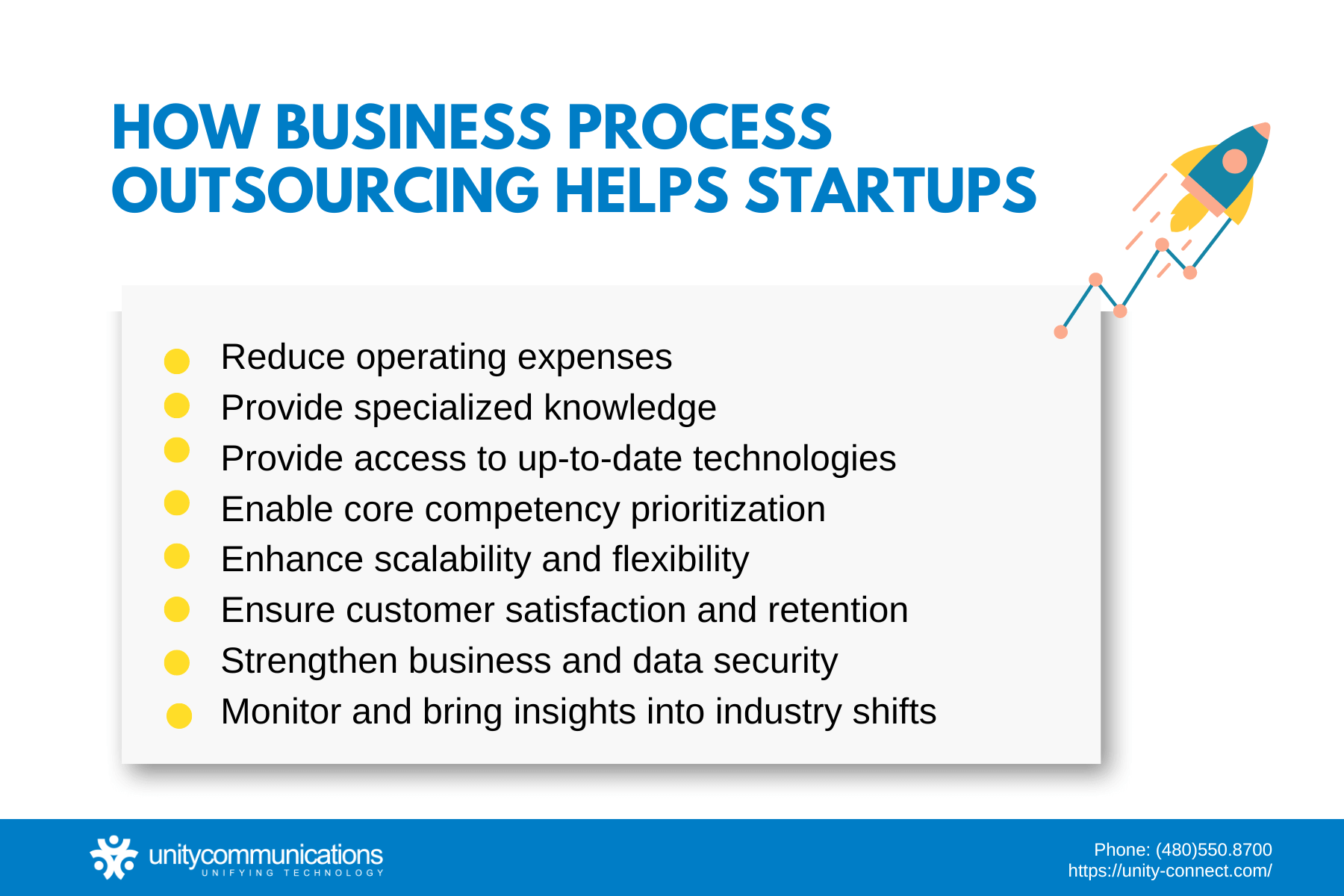IN THIS ARTICLE
Table of Contents
It takes hard work to start a small business from scratch. Reaching your target audience requires a series of intricate steps. You need a well-organized strategy to get the most out of your limited resources.
Fortunately, business process outsourcing (BPO) is here to help. Providers offer packages that include both front- and back-end support at affordable rates.
Recent statistics show that 83% of small businesses will spend more on outsourced services in 2023. But why?
Let us discover why entrepreneurs see BPO as a game-changer for their startups.
Why Do Startups Adopt BPO?

Getting a business off the ground has always been tough, so some startups adopt BPO to cost-effectively maintain their operations in the long term.
Startups often have to deal with limited funds and human resources. Every dollar spent should go to their core business, and each goal should push their business forward to give them an advantage over the competition.
BPO becomes important for startups in this context. Entrusting specific non-core functions to a third party allows them to focus on enhancing their primary products and services. BPO can also help them maximize specialized resources for improved productivity and reduced operating costs.
Due to such BPO advantages, Clutch expects 83% of small businesses to keep or increase their outsourcing spend in 2023. Cost savings and access to industry experience motivate them to outsource the following tasks:
- Customer service
- E-commerce support
- Information technology (IT) support
- Human resources (HR) support
- Sales and marketing
- Order fulfillment and inventory management
- Accounting and financial services
- Knowledge and legal processing
- Data entry and management
- Cloud services
Common Challenges Faced by Startups
While exploring what BPO is, you must identify the challenges preventing your small business from growing. As you draft your outsourcing plan, know what issues you currently have and will encounter. This way, you know how to develop the right solutions based on available startup BPO options.
In addition to limited financial, human, and technological resources, startups encounter these gaps:
- High operating expenses. Establishing a new business requires significant funds for labor, infrastructure, and real estate expenses. Startups need to divide their budget accordingly to meet daily requirements.
- Uncertain market conditions. Changing customer preferences, competitive landscapes, and regulatory preferences influence strategic planning and decision-making. These factors impede startups from ensuring market entry, growth, and sustainability.
- Complex talent acquisition and retention. Small businesses struggle to recruit the best talent and keep in-house staff. Large companies that offer higher compensation make talent acquisition and retention more challenging.
- Fast technology modernization. A startup’s limited budget prevents it from adapting to continuous technology modernization, and the inability to update systems might result in persistent errors and slow operations.
- Complex regulatory and compliance requirements. Processing legal requirements for intellectual property, data privacy, and operational licenses is difficult and costly. Unexpected issues, such as missing data, also add to the complexity.
- Fast-paced market competition. Startups compete against other small businesses as well as medium and large corporations. A lack of resources and small-scale brand awareness challenge them to keep up with the fast-paced market competition.
How BPO Helps Startups Overcome Challenges

Outsourcing services to a third party lets startups address the challenges mentioned above in various ways; below are the common ones.
- Reduce operating expenses. BPO eliminates the need for startups to spend separately on labor, infrastructure, and real estate.
- Provide specialized knowledge. Talent acquisition remains a top in-house challenge in meeting strategic priorities; 50% of executives reported this in a recent Deloitte survey. As a result, small businesses rely on outsourcing to quickly access and deploy a diverse pool of highly skilled professionals.
- Provide access to up-to-date technologies. BPO companies employ cutting-edge systems to meet their clients’ routine business requirements. They deploy modernized solutions such as artificial intelligence (AI), cloud computing, and robotic process automation (RPA) to quickly and accurately accomplish repetitive tasks.
- Enable core competency prioritization. Working with service providers allows startups to focus their time, effort, and resources on improving their key products and services.
- Enhance scalability and flexibility. Service providers adjust to their clients’ changing demands and standards. This capability allows small businesses to easily scale their operations, especially during hectic seasons.
- Ensure customer satisfaction and retention. Outsourcing customer support helps small businesses deliver fast and effective responses to multiple inquiries. Service providers use an omnichannel platform to ensure a satisfactory customer experience.
- Strengthen business and data security. Because BPO involves exchanging confidential data via online platforms, providers follow and implement strict security measures. They do so to maintain their credibility and strengthen client trust.
- Monitor and bring insights into industry shifts. Watching out for market trends and customer behavior remains a time-consuming and challenging task. Fortunately, providers have the tools to expedite data collection and analysis to inform strategic decisions. This helps startups achieve a competitive advantage.
Right Goals Equal Game-changing BPO for Startups

When delving into the realm of BPO for small businesses, it becomes evident that meticulous goal setting is crucial. To sustain and propel your startup, it is imperative to have a clear understanding of your outsourcing objectives. The initial step involves classifying these goals into either short-term or long-term targets.
Long-term objectives come into play when you envision a partnership with a service provider over an extended period, often several years. These strategic business goals include enlisting a third-party customer service team to enter a new market and expand your presence within a year.
Conversely, short-term goals are designed to be achieved within a relatively brief timeframe, typically ranging from a few months to a few weeks, depending on the urgency of your requirements. These objectives are geared towards attaining immediate results. For instance, you may aspire to enhance your back-office productivity by 10% during the holiday season.
Regardless of the goals you incorporate into your BPO agenda, it is paramount to structure them in alignment with the SMART model for effective progress monitoring. This entails crafting objectives that are specific, measurable, achievable, relevant, and time-bound, ensuring that your desired outcomes are not only attainable but also yield favorable returns on investment.
The Bottom Line
BPO is crucial in resolving common problems faced by startups. Service providers have cost-effective solutions to help small businesses address various issues, from high operating costs to fast-paced market challenges.
However maximizing outsourcing benefits is not one-sided; you must play your part in optimizing BPO. Make sure you clarify your short-term or long-term goals before hiring a provider. Ensure your objectives are practical to achieve your intended success.
Want a reliable BPO provider capable of meeting your startup goals? Let’s connect and talk about it. Our team at Unity Communications has the best resources and strategies to help solve your problems at an affordable cost.





